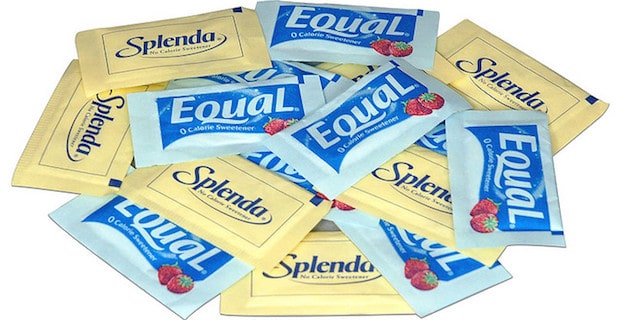
Acesulfame-potassium, aspartame, saccharin and sucralose, the big four artificial sweeteners have slipped into our food supply largely unnoticed by the public. They can be found in almost anything; cereals, chewing gum, mouthwash, toothpaste, peanut butter, jam, condiments, and even a seemingly healthy food like whole grain or bran cereals.
Read more about the Scary Seven foods to avoid
Why are artificial sweeteners used in our food production in the first place?
Artificial sweeteners were first introduced in the late 70s as a way to help those with diabetes manage their blood sugar. Because artificial sweeteners are hundreds of times sweeter than sucrose (table sugar), infinitesimal amounts are needed to add a sense of sweetness without adding any calories. Because of this, a market of foods was created geared towards those who wanted to lose weight, or prevent weight gain – a move that was speculative and not grounded in solid research. Sugar free and ‘diet’ foods have not been shown to help with weight loss or preventing weight gain outside of a research setting.[Infographic] Artificial Sweeteners
What are the concerns about artificial sweeteners?
The largest concern with artificial sweeteners is their safety profile. While the proponents of them state there is not any convincing evidence showing them to be harmful, say like smoking is, it’s not the same thing to state they are safe as critics of artificial sweeteners say, and they’re right.
There are a lot of animal studies that suggest consuming large amounts of artificial sweeteners can increase the risk for cancer and or neurological complications, and there are a lot of anecdotal reports of people having undesirable side effects. What is less clear is the weight of the evidence from studies showing any harm when artificial sweeteners are consumed in smaller amounts, amounts that would be normally consumed when using sugar-free products made with artificial sweeteners. If the risk claims are accurate, we should see disproportionately higher rates of cancers, etc in those groups who have been the highest consumers of artificial sweeteners over the past 30 years, those with diabetes, but we’re not.
Read a real woman's account of being poisoned by aspartame
Another potential problem with artificial sweeteners that is backed by research is that due to their highly sweet taste, they may ‘reset’ our taste perception and foods that are naturally less intensely sweet tasting may not offer the same satisfaction as they did before. This phenomenon may lead a person to seek out more food in an attempt to please the pleasure centers of our brains.
How to avoid artificial sweeteners
Read, read, and read some more. Use the ingredient lists of any food or product that is packaged if you want to avoid them. The choice to avoid artificial sweeteners is ultimately a personal one, the evidence to do so because of any explicit harm is less than robust but for anyone looking to follow a more natural lifestyle, the choice is clear.

Image: Bukowsky18










